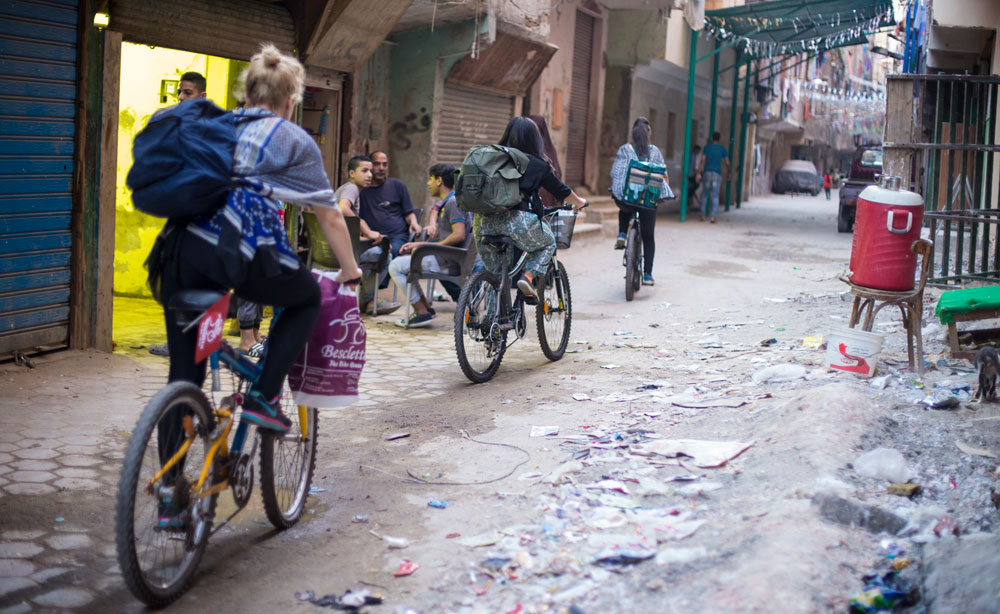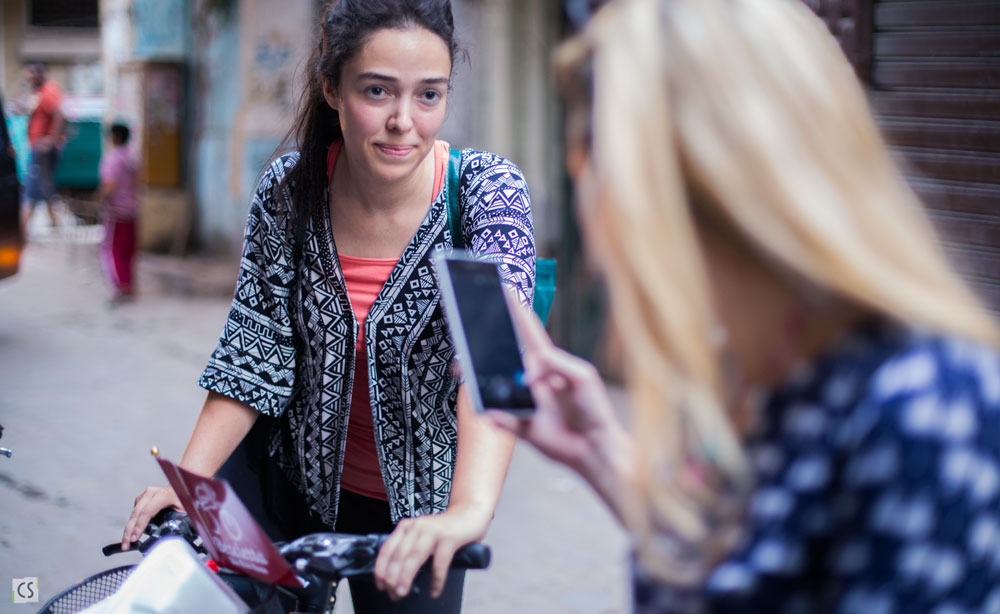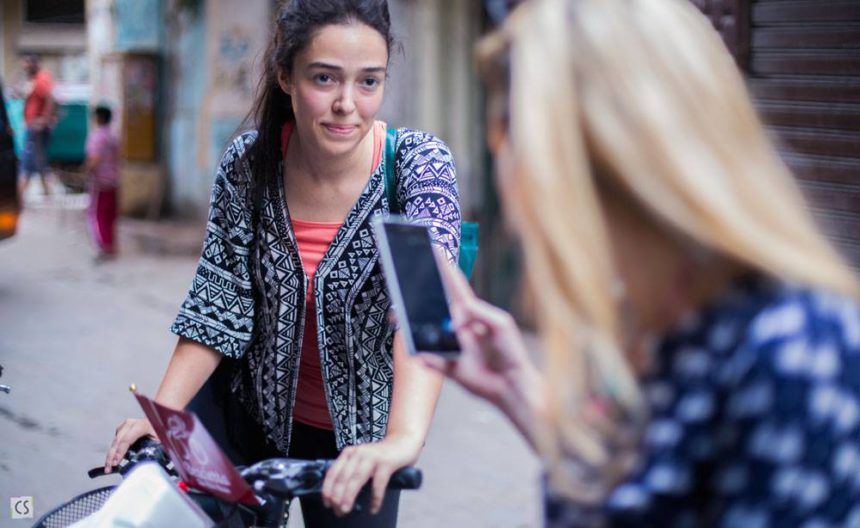On a hot Ramadan summer, I joined Nouran Salah on a bike ride through Cairo’s Ard El Lewa district to distribute meal boxes to underprivileged people for her Ramadan initiative Bel Bicycle.
Jun 22,2016
It’s 5:40 PM and Cairo’s frenzied Game’at El Dowal avenue looks notoriously calmer than its usual nerve-racking chaos. During the 30 days of Ramadan, the afternoon looks strikingly calm as people await to break their fast; traffic runs smoothly, there are few cars in the street, and horns are less ear-piercing. Unless you are a girl riding a bike.
Challenging street safety and defying social prejudice, Nouran Salah gears up to get on her bicycle and ride through the rowdy streets of Cairo’s slums to give out the meal boxes she is carrying in her bag. Her initiative, Bel Bicycle, provides hot meals for people in need to have their Iftar (the first meal after the day-long fast), while empowering women to battle the prejudice linked to female cycling.
When we arrive to the meeting point in Mohandiseen, seven girl volunteers are all ready to set out, while Salah tucks the meal boxes into their backpacks. The 26-year-old woman was inspired by a Hungarian initiative called Debrecen Bike Maffia, which collects donations to cook for the poor and distribute the meals by bicycle. “I met them on a trip to Tunisia; they are like 200 and they cycle to very remote areas to help those in need,” she says. “I had rented a bicycle before in Cairo, and I loved how you can use it for everything, from going to work, to doing exercise, to running errands. So I wanted to encourage other women to cycle in Egypt, and break this idea that women cannot do it.”

“I believe that when people see you doing something good, they support you and help you,” says founder Nouran Salah.
Even though some people warn her about safety, Salah says she doesn’t feel in danger. “Some of the girls are scared or worried at the beginning, but I always tell them there is no danger. All it takes is courage. I know that there are no bicycle lanes and it may take time to cross the street, but people make way for you. I find it amazing that they consider you the weakest point in the street, so they always leave space for you. A lot of people cheer us up, old women shout ‘bravo aleiki‘,” she says.
The difficult part, she recalls, was finding someone who had a bicycle. “I started by searching for people who had bicycles in order to borrow them, but no one had any. I also tried to rent them, but no one was offering me an average price. Frustrated, I wrote a status on Facebook asking for help, and a girl put me in touch with Bescletta, a company that sells bicycles and sponsored the cause. I sent them a formal proposal, and in exactly two seconds he called me saying ‘Come tomorrow. I want to support you. The bike is ready for you’,” she says.
The volunteer women meet in Mohandiseen to begin the journey to different underprivileged areas.
“What’s beautiful about Egypt is that everyone can take care of your bicycle. Wherever I go, I ask someone, be it the bawab, or the person taking care of the building, and they are always so helpful,” she adds. A year ago, this intrepid young woman who works as an interior designer decided to spend her birthday cycling across the city distributing chocolates. “It makes me really happy to see other people happy,” she says.
The ride through the five-lane-wide Game’at el Dowal avenue begins; the most stressful one of a series – or so I thought at first. As we take a U-turn and cross over to the other side, Cairo’s trademark microbuses and their unrivaled beeping horns sweep next to us, while some people standing on the boulevard film us with their cell phone cameras. 
The girls, some as young as 15, carry between 40 and 100 meal boxes prepapred by a Syrian refugee lady.
The project, she explains as we pedal along, is structured like a cycle where every piece perfectly feeds the rest. During sohour time, Salah prepares between 40 and 50 sandwiches to sell in Zamalek, Maadi or Heliopolis, to use the proceeds to buy food boxes from Syrian refugee women. “I make fool and gibna bel tomatem sandwiches with the help of my mom and the house keeper, who I consider my second mom,” she explains. “My family has been incredibly excited to support me; even my father who lives abroad calls me on the phone every day to ask if I managed to sell the sandwiches today, even though he is concerned of the areas I go to,” she says.
Every day at midnight, Salah goes out to sell sandwiches to young people eating their last meals before fasting time begins again. “During sohour time, streets are very busy, so we go and tell people about our idea, and most of them are really impressed. Each sandwich costs 10 LE, but some even pay 50 or 100 just to support us,” she explains.
By the end of a night, the young woman collects nearly 400 LE, plus donations she collects through her Facebook page. “With that money, I pay the Syrian lady, who delivers boxes with chicken, rice, and tahini to my house, ready to be distributed, each one of them for 20 LE. Every week, I try to ask for a meal from a different person, to benefit as many refugee women as possible,” she says.
During sohour time, Salah prepares between 40 and 50 sandwiches to sell, and uses the proceedings to buy food boxes from Syrian refugee women.
We stop at the tip of the bridge to catch our breath and wait for two girls that have fallen behind. These girls have been fasting for 14 hours and somehow managed to find the strength of will and physical energy to pedal across the unruly streets of Cairo, dodging from zig-zagging tok-toks, to garbage piles, sheep packs, and beeping motorcycles.
As we arrive to Ard El Lewa, the deafening noise fades out. Its narrow alleys, which can barely fit a car, are decorated with colorful garlands all the way up the buildings, often crowned by Ramadan fawanees. All shops are closed and the faint sound of a mosque anticipating the maghreb prayer whispers from afar. A few men standing at one of the kiosks stare at us, often asking where were are going.
“Some people may try to flirt, but as soon as they see us distributing food they say ‘may God bless you’. I believe that when you do something good, God will always protect you; and when people see you doing something good, they support you and help you,” she says.
“When we went to Meet Okba, we met a seven-year-old kid named Ahmed who was staring at us, so we asked him: “Listen, Ahmed, we are looking for old women who really can’t get out of their house to get food to eat; can you take us to them?’ So he took us around the neighbourhood for an entire hour on his bike, letting us into the houses of women who were not able to move and were really poor.”
It’s 7 PM and the call to prayer begins to echo across different mosques, sparking a sudden flock of people onto the streets who come out to buy juice at the corner stand. There are tok-toks rushing by, men flurrying back and forth, and some cars hardly succeeding in making their way through the chaotic road. Salah gathers with her volunteers, gets some water, and distributes the bottles to the exhausted team that she gathered through calls on her Facebook page.
“I want to encourage other women to cycle and break this idea that women cannot do it,” says Salah.
“After seeing that the initiative is working, one of my friends told me ‘you are too good to be Egyptian’ and that sentence didn’t make me happy at all. It just startled all the snakes I have in me to prove that Egyptians are amazing. My whole house supports me insanely; my mom would yell at me if I am late with delivering, my second mom is so fast with preparing, and my little sister helps with all the photography needed and she’s always just there, and my dad supports even if he is 1,000 km away,” she says. “The two girls who motivated me insanely, Mia and Aya – who was going to buy a bike for me if I couldn’t find one – and even the hundreds of young guys and girls, who so eagerly buy the sandwiches for sohour,” she emphasizes.
As Iftar time has dropped and we make our way back to the up-scale district of Mohandiseen, Salah gears up to have her iftar meal with her family in order to, then, begin preparing sohour sandwiches to sell. And the cycle begins again.
This article is part of the #SceneKheir series, aiming to highlight different charity initiatives throughout the month of Ramadan. For more information and to support the cause, visit their Facebook page.
Photography by @MO4Network’s #MO4Productions.
Photographer: Mohamed Hosny
Videographer: Mina Saber
This article was originally published on Cairoscene.



Leave a Reply